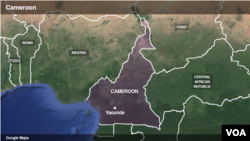Blind people in Cameroon were protesting this week against job discrimination when according to witnesses, police bundled them up and dumped them outside the city. Despite the alleged abuse, the protests continue.
Scores of blind Cameroonians continued a week-long protest Friday in the capital against job discrimination, despite allegations this week of police abuse.
The visually impaired braved heavy rain Thursday in Yaoundé to protest in groups of nine along seven major streets.
They raised their white canes and said the world should know that Cameroon’s police abused them every day this week while they were asking the government to provide them with jobs.
Arnaud Djikissi is a spokesperson for the protesters.
He says on day one of the protest on Monday, Cameroon police destroyed their white canes, tore dresses, and arrested and detained blind persons for up to six hours. Djikissi says on Tuesday, while they protested in front of the prime minister's office, his group of more than 60 blind men was again abused by police. He says the police bundled them in buses, dumped blind persons outside of the capital Yaoundé, and told the sightless people to find their way back home.
When contacted by VOA, Cameroon police acknowledged clearing the streets of the blind protesters for what they said were illegal protests.
But officials at Yaoundé’s first central police station would not comment on allegations they drove blind people outside of Yaoundé and abandoned them.
Eyewitnesses told VOA that police dumped the blind protesters in different districts outside of Yaoundé, some as far as 30 kilometers away. The protesters had to call family members or appeal for rides from drivers passing by to get home.
Local media reported that blind people on Thursday protested the police abuse in towns including Bamenda, Buea and Mbalmayo.
Tancho Fidel is president of the Bamenda-based Organization for the Realization of an Inclusive Society.
"Blind people in Cameroon are not given jobs," said Fidel. "They are considered as underdogs. When they come out to decry the situation, they are tortured. We want the Cameroon government to consider us as able people and normal human beings."
Cameroon passed a law in 2010 mandating protections for people with disabilities, including the visually impaired.
But blind Cameroonians say most employers ignore the law, which is rarely enforced.
Cameroon’s government says there are about 600,000 blind people in the country and more than one million who are visually impaired.




